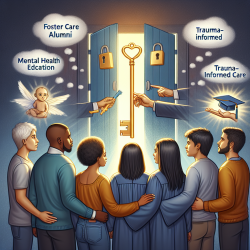Unlock the Secrets: What Speech Pathologists Can Learn from Zimbabwe's Beer Hall Study!
As a passionate advocate for data-driven decision-making in speech-language pathology, I find it crucial to explore research findings beyond our immediate field. One such study that offers valuable insights is the "Evaluation of a Peer Network-Based Sexual Risk Reduction Intervention for Men in Beer Halls in Zimbabwe." Although the study primarily focused on HIV prevention, its methodology and findings can inspire speech-language pathologists to refine their practice and improve outcomes for children.
Understanding the Study
The study was a randomized controlled trial (RCT) conducted in 24 beer halls in Harare, Zimbabwe. It aimed to reduce sexual risk behaviors associated with alcohol consumption among men. The intervention involved training male beer hall patrons to act as peer educators, promoting safe sexual practices among their peers. Despite high engagement levels, the study found no significant impact on the primary outcome measure—episodes of unprotected sex.
Lessons for Speech-Language Pathologists
While the study's primary focus was on HIV prevention, several aspects can be applied to speech-language pathology:
- Peer Influence: The study highlighted the power of peer influence in behavior change. In speech-language pathology, leveraging peer interactions can enhance communication skills in children. Encouraging peer modeling and group therapy sessions can create a supportive environment for skill development.
- Community-Based Interventions: The study utilized a community-based approach, engaging participants in familiar settings. Speech-language pathologists can adopt similar strategies by involving families and communities in therapy processes, ensuring that interventions are culturally relevant and accessible.
- Data-Driven Adjustments: Despite the study's lack of significant impact, it underscores the importance of using data to evaluate intervention effectiveness. Speech-language pathologists should continuously collect and analyze data to tailor interventions and optimize outcomes for children.
Encouraging Further Research
The Zimbabwe study serves as a reminder of the need for ongoing research and innovation in intervention strategies. Speech-language pathologists are encouraged to explore and contribute to research that examines the efficacy of peer-based and community-oriented interventions. By doing so, we can expand our understanding and improve practices that lead to better outcomes for children.
Conclusion
While the Zimbabwe beer hall study did not achieve its intended outcomes, it offers valuable insights for speech-language pathologists. By embracing peer influence, community-based interventions, and data-driven adjustments, we can enhance our practice and create positive outcomes for children. To delve deeper into the original research, please follow this link: Evaluation of a Peer Network-Based Sexual Risk Reduction Intervention for Men in Beer Halls in Zimbabwe: Results from a Randomized Controlled Trial.










